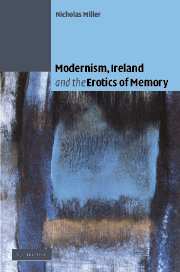Book contents
- Frontmatter
- Contents
- List of illustrations
- Acknowledgments
- Introduction. All history is local: modernism and the question of memory in a global Ireland
- Part I THE EROTICS OF MEMORY
- 1 Lethal histories: memory-work and the text of the past
- 2 A Pisgah sight of history: critical authority and the promise of memory
- 3 A reservation under the name of Joyce: Rossellini's Viaggio in Italia and the symptom
- Part II THE SPECTACLES OF HISTORY
- Afterword. The ends of memory and the ex-sistence of Ireland
- Notes
- Bibliography
- Index
3 - A reservation under the name of Joyce: Rossellini's Viaggio in Italia and the symptom
Published online by Cambridge University Press: 22 September 2009
- Frontmatter
- Contents
- List of illustrations
- Acknowledgments
- Introduction. All history is local: modernism and the question of memory in a global Ireland
- Part I THE EROTICS OF MEMORY
- 1 Lethal histories: memory-work and the text of the past
- 2 A Pisgah sight of history: critical authority and the promise of memory
- 3 A reservation under the name of Joyce: Rossellini's Viaggio in Italia and the symptom
- Part II THE SPECTACLES OF HISTORY
- Afterword. The ends of memory and the ex-sistence of Ireland
- Notes
- Bibliography
- Index
Summary
Muta: Petrificationibus! O horild haraflare ! Who his dickhuns now rearrexes from undernearth the memorialorum?
Juva: Beleave filmly, beleave!
James Joyce Finnegans Wake“Je ne suis pas dans ma meilleure forme aujourd'hui, pour toutes sortes de raisons” [I am not in my best form today, for all sorts of reasons]. Such was the qualifying disclaimer with which Jacques Lacan began one of his final theoretical investigations, a year-long seminar devoted as much to literary as to psychoanalytic topics titled “Joyce le symptôme.” From a certain point of view, it is unreasonable to doubt the straightforward honesty of Lacan's disclosure. His health was at this time beginning the precipitous decline which would be halted only by his death, six years later, at the age of eighty. Yet from another perspective, the statement's prominence in a crucial theoretical text devoted to the function and formation of symptoms seems deliberately suggestive: the state of Lacan's health aside, the comment is interesting since it refers obliquely to Lacan's topic, the symptom that is itself precisely the evidence that one is not in one's “best form.” Moreover, what makes the statement's appearance in the much-revised published version of the seminar particularly compelling is that it is the analyst, and not the analysand, who is speaking.
Academic criticism typically requires that those who would interpret literary texts do so with a degree of objectivity and mastery, closeting their symptomatic inadequacies to as great an extent as possible.
- Type
- Chapter
- Information
- Modernism, Ireland and the Erotics of Memory , pp. 66 - 94Publisher: Cambridge University PressPrint publication year: 2002



